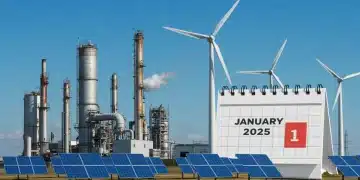Climate tech developments trends you need to know

Climate tech innovations face challenges such as financial barriers, regulatory complexities, and market uncertainty, which hinder their development and adoption despite their potential to combat climate change effectively.
Climate tech developments trends represent the forefront of tackling environmental challenges. As advancements unfold, have you considered how these innovations could shape our daily lives and the planet’s future?
Understanding climate tech: What’s driving innovation?
Understanding the driving forces behind climate tech is essential for anyone interested in the future of our planet. With global concerns about climate change rising, this innovation sector is blossoming. Various factors are fueling the growth of climate technology, creating opportunities for research and development.
Key Drivers of Climate Tech Innovation
Government policies play a critical role in encouraging new technologies. By offering incentives for renewable energy, countries push businesses to adopt sustainable practices. The impact of consumer demand cannot be ignored either. As more individuals seek eco-friendly products, businesses are forced to innovate to meet these expectations.
- Regulations promoting renewable energy
- Investment in sustainable practices
- Technological advancements in energy storage
- Public awareness on climate issues
Many startups focus on developing cutting-edge solutions to combat climate issues directly. For example, innovations in carbon capture technology aim to reduce greenhouse gases in the atmosphere. Other new developments involve utilizing waste materials to create energy, thus supporting a circular economy.
The Role of Collaboration
Collaboration between businesses and governments is also crucial. When companies partner with educational institutions, fresh ideas emerge, driving innovation in climate solutions. This teamwork creates a culture of shared knowledge, allowing technical challenges to be addressed more efficiently.
Furthermore, international cooperation is necessary. By sharing resources and expertise, countries can tackle climate change more effectively. Working together on a global scale reveals the interconnected nature of environmental challenges, making collective action indispensable.
In summary, understanding the innovations in climate tech requires looking at various factors such as policies, consumer interest, and collaboration. By embracing these trends, society can foster solutions to help combat climate change.
Key trends in climate technology to watch

Key trends in climate technology are emerging as the world seeks innovative solutions. These trends are not only responsive to climate change but also reflect the rapid advancement of technology. Observing these trends can guide us in understanding the potential for a sustainable future.
Renewable Energy Innovations
One significant trend is the rise of renewable energy innovations. Solar panels and wind turbines are becoming more efficient, which helps in reducing costs. As technology improves, more households and businesses are adopting these energy sources.
- Increased efficiency of solar panels
- Offshore wind farms expanding globally
- Energy storage solutions for renewable sources
- Smart grids for enhanced energy management
Another important area is electric vehicles (EVs). As more consumers shift towards EVs, automakers are innovating to improve range and battery life. This trend supports efforts to reduce greenhouse gas emissions on a global scale.
Sustainable Agriculture
Sustainable agriculture techniques are also gaining attention. Farmers are adopting technology to enhance crop yield while reducing resource consumption. Controlled environment agriculture, such as vertical farming, shows promise for urban areas.
While we explore these advancements, we see technologies aimed at improving energy efficiency in buildings. Smart home solutions now allow for better energy management, leading to reduced consumption. These systems often provide real-time data, helping homeowners to make informed decisions.
International collaboration is driving many of these trends. Partnerships between countries focus on sharing resources and technology to combat climate change effectively. As industries unite, various innovative solutions are becoming more accessible.
Real-world impacts of climate tech developments
The real-world impacts of climate tech developments are becoming evident as innovative solutions take shape. From reducing carbon footprints to enhancing energy efficiency, these advancements are transforming industries and lifestyles. As we explore these impacts, it’s clear that climate technology is driving crucial changes across various sectors.
Energy Sector Transformation
One of the most significant impacts can be seen in the energy sector. The rise of renewable energy sources has led to a substantial decline in reliance on fossil fuels. This shift not only helps combat climate change but also fosters energy independence.
- Reduced greenhouse gas emissions
- Lower energy costs for consumers
- Increased job creation in green industries
- Innovations in energy storage technology
In addition, the use of smart technology in energy management systems allows for real-time monitoring and optimization of energy usage, which further enhances efficiency. As businesses adopt these systems, they’re able to cut costs and reduce their environmental impact.
Sustainable Practices in Agriculture
The agriculture sector is also experiencing significant advancements due to climate tech. Techniques such as precision farming utilize data analytics to optimize crop yields while minimizing resource use. These practices lead to healthier soil and reduced water consumption.
With the ongoing development of vertical farming, cities can grow food in urban environments, decreasing transportation emissions and offering fresh produce to local communities. This innovation aligns with efforts to create a sustainable food supply chain.
Moreover, businesses embracing these sustainable practices often see improved brand loyalty from consumers who value corporate responsibility. Consumers are more inclined to support businesses that align with eco-friendly values.
The collaboration between tech companies and environmental organizations is helping to promote awareness and drive further innovations. Together, they are addressing climate challenges while encouraging community involvement.
Challenges faced by climate tech innovations

Challenges faced by climate tech innovations are significant and multifaceted. As the world pushes for technological solutions to combat climate change, various obstacles can slow down progress. Understanding these challenges is crucial for developing effective strategies.
Financial Barriers
One major challenge is the financial barrier to entry. Many innovative climate technologies require substantial initial investments. This can discourage startups from developing new ideas or scaling existing solutions. Investors often hesitate to fund projects with uncertain returns, making it hard for entrepreneurs to secure the necessary capital.
- High costs of research and development
- Limited access to funding sources for startups
- Market competition from established industries
- Slow initial adoption rates from consumers
This financial hesitation can delay the spread of vital innovations needed to address climate change effectively.
Regulatory Challenges
Another significant challenge lies in the regulatory landscape. Navigating complex regulations can be daunting for companies looking to innovate. Ensuring compliance with existing laws can divert valuable resources from R&D to legal processes. Additionally, regulations that are not updated to keep pace with technology can hinder progress.
Many companies find it challenging to adapt to changing policies, which can create uncertainty in the market. This unpredictability can make investors wary, further complicating funding efforts.
Moreover, the technological adoption rate among consumers often depends on their understanding of climate tech. Many individuals are unfamiliar with how these technologies function or their benefits. This lack of awareness can hinder widespread adoption and limit the impact of innovations.
FAQ – Frequently Asked Questions about Climate Tech Innovations
What are the main challenges faced by climate tech innovations?
Main challenges include financial barriers, regulatory complexities, and market uncertainty, which can hinder progress in the sector.
How do financial barriers impact climate tech startups?
High initial costs can make it difficult for startups to secure funding and bring their innovations to market.
What role do regulations play in climate tech development?
Regulations can slow down innovation by creating compliance hurdles that consume resources and time.
How can collaboration enhance climate tech solutions?
Collaboration between businesses, governments, and communities often leads to shared knowledge and resources, driving better and faster innovation.





